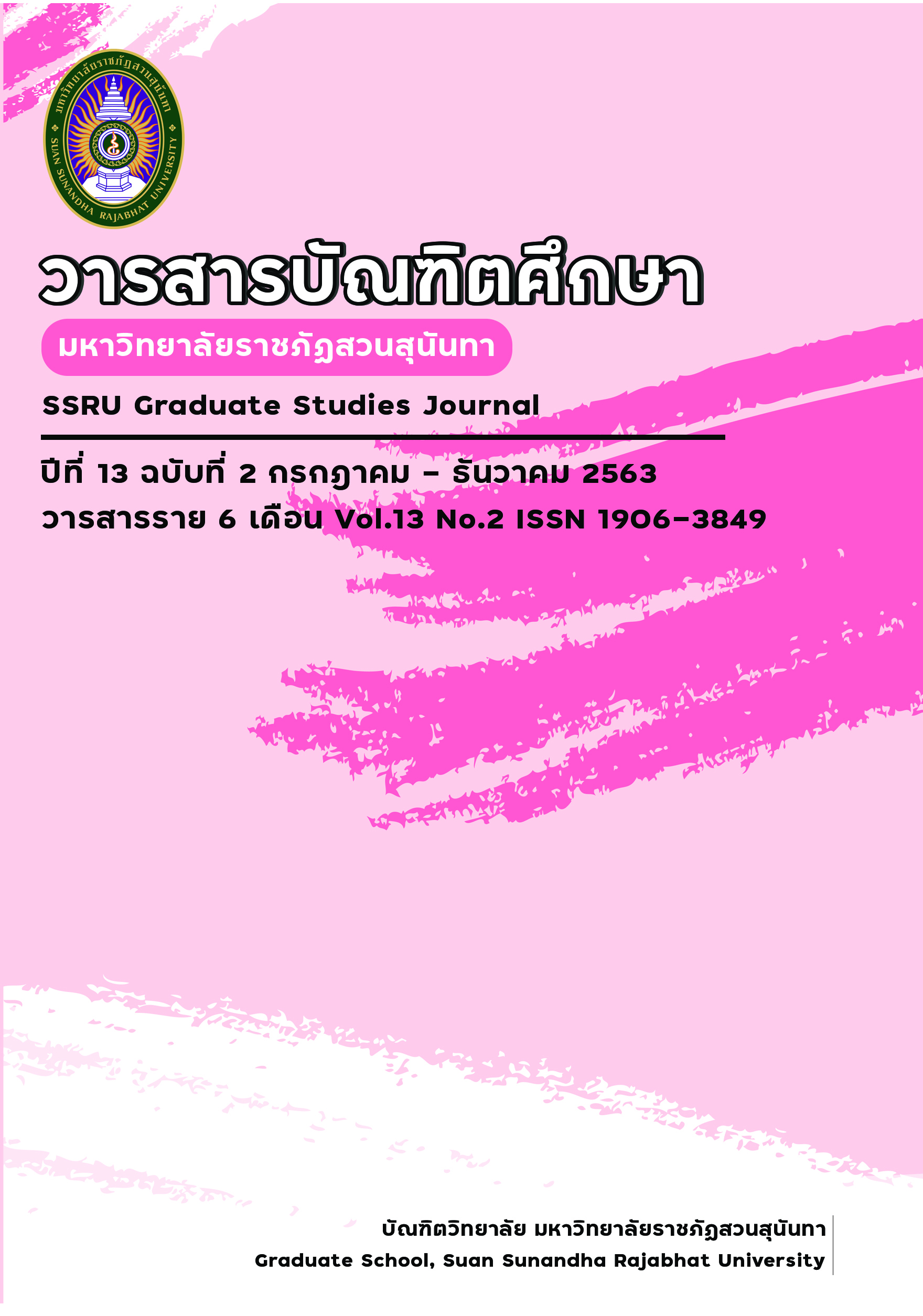Tourism Product-Related Purchasing Behaviors and Online Media Marketing Mix of Generation X and Y Tourists
Main Article Content
Abstract
This research was a quantitative research in nature. Its objectives were to: 1) examine the relationship of Generation X tourists and their purchasing behaviors through online media; 2) study the differences of Generation X and Generation Y tourists which influenced the online media marketing mix 9P’s factors. The target population of this study were Thai and foreign tourists aged between 39-58 years and 17-38 years, consisting of 384 people. The research instrument was a questionnaire. Statistics applied for data analysis were descriptive analysis and inferential analysis using Chi-square and t-test.
Research results show that most Generation X and Generation Y tourists used purchased airline tickets and booked hotels/accommodation via online media. Most of them purchased tourism products through the website of the travel product suppliers directly. They normally took more than 10 days before making a decision to purchase/book. Their main traveling purpose was for leisure, and they made a decision by themselves. Credibility of the websites had an influence on their buying decision. The Generation X and Generation Y tourists had a relationship in terms of: their online purchasing behaviors of tourism products including airline tickets and food & beverages at the restaurants; timing of purchase; reasons for purchase; participants in purchasing decisions; and assessment of alternatives. Moreover, for the online media marketing mix, both groups of the tourists had no difference in their opinion in terms of product, price, place, promotion, process, partner, package, and perception, but their opinion was different in terms of sales people.
Article Details
References
จรัสกร วรวสุนธรา. (2560). การสื่อสารการตลาดดิจิทัลบนเส้นทางการตัดสินใจซื้อของผู้บริโภค ที่ส่งผลต่อการตัดสินใจซื้อสินค้าประเภทแฟชั่นผ่านเว็บไซด์พาณิชย์อิเล็กทรอนิกส์.
บัณฑิต สวรรยาวิสุทธิ์. (2561). การตลาดทางตรง. ขอนแก่น: โรงพิมพ์มหาวิทยาลัยขอนแก่น.
พุทธชาติ ทองนาค และสุรเสกข์ พงษ์หาญยุทธ. (2561). พฤติกรรมการใช้สื่อออนไลน์
ของนักท่องเที่ยวที่ส่งผลต่อการเลือกแหล่งท่องเที่ยวในจังหวัดนครศรีธรรมราชสืบค้นเมื่อ 2 พฤษภาคม 2563,
จาก http://www.baabstract.ru.ac.th/index.php/abstractData/viewIndex/173.ru
มนัสวี ศรีนนท์. (2561). ทฤษฎีเจเนอเรชันกับกรอบวิธีคิด. วารสาร “ศึกษาศาสตร์ มมร”
คณะศึกษาศาสตร์
มหาวิทยาลัยมหามกุฏราชวิทยาลัย, ปีที่ 6(1), 364-373.
วรัญญา โพธิ์ไพรทอง. (2556). ปัจจัยที่ส่งผลต่อการตัดสินใจซื้อเสื้อผ้าจากร้านค้าออนไลน์.
(การศึกษาค้นคว้าอิสระปริญญามหาบัณฑิต). มหาวิทยาลัยธรรมศาสตร์, คณะพาณิชยศาสตร์และการบัญชี.
วฤตดา วรอาคม. (2557). 5 อินไซต์เจเนอเรชั่นซี. สืบค้นเมื่อ 7 พฤษภาคม 2563, จากhttp://www.bangkokbiznews.com/blog/detail/591770
วุฒิ สุขเจริญ. (2559). พฤติกรรมผู้บริโภค (Consumer Behavior). (พิมพ์ครั้งที่ 2).กรุงเทพมหานคร:
จี.พี.ไซเบอร์พรินท์
ศิริวรรณ เสรีรัตน์ และคณะ. (2546). การบริหารการตลาดยุคใหม่. กรุงเทพฯ: บริษัท ธีระฟิล์ม
และไซเท็กซ์ จำกัด.
สยมล วิทยาธนรัตนา. (2555). อนาคตของเทคโนโลยีในอุตสาหกรรมการท่องเที่ยว ตอนที่ 2.
สืบค้นเมื่อ 28 พฤษภาคม 2563, จาก http://www.etatjournal.com/web/menu-read-web-etatjournal/menu-2012/menu-2012-jan-mar/383-12555-futute-technology2
อมรรัตน์ ทันมา. (2558). อิทธิพลของการสื่อสารการตลาดต่อการตัดสินใจซื้อเสื้อผ้าสำเร็จรูปของ
สุภาพสตรีผ่านเครือข่ายสังคมออนไลน์ :กรณีศึกษากรุงเทพมหานคร. วารสารอิเล็กทรอนิกส์การเรียนรู้ทางไกลเชิงนวัตกรรม, ปีที่ 1(3), 110-124.
Alexander, B. and Maik, E. (2015). The importance of trust for personalized online advertising. Journal of Retailing, 91(3), 390-409.
Chen, C., Ku, E. and Yeh, C. (2019). Increasing rates of impulsive online shopping on tourism websites. Internet Research, 29(4), 900-920. Retrieved April 19, 2020, from https://www.emerald.com/insight/content/doi/10.1108/INTR-03-2017-0102/full/html
Greenberg, E. H. and Weber, K. (2008). Generation We. United States of America: Pachatusan.
Kotler, P. (1997). Marketing management: analysis, planning implementation and control (9th ed.).
New Jersey: Asimmon&Schuster.
Kotler, P. (2000). Marketing Management (The Millennium ed.). Upper Saddle River,NJ:
Person Prentiec-Hall.
Lissitsa, S. and Kol, O. (2016). Generation X vs. Generation Y–A decade of online shopping. Journal of Retailing consumer Services, 31, 304-312.
Schiffman, L. G. and Kanuk, L. L. (2007). Consumer Behavior. New Jersey:
Prentice-Hall.
Seok, I. and Google Inc. (2017). Smart Online SMEs (S.O.S). Department
of International Trade Promotion: Ministry of Commerce: Thailand.


